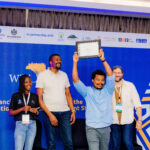Wikipedia is one of the top websites in the world relied on by students, scholars, journalists, and citizens. However, it is still battling gender disparity.
It is estimated that 90 percent of the encyclopedia’s top editors are male and most of its content is about men.
The need to close the gap is what sparked Wikigap, an initiative that aims at surfacing the achievements of women in the world’s largest encyclopedia.
It gathers people around the world to increase the representation of articles by, and about women on Wikipedia.
Wikimedia Community User Group Rwanda, a non-governmental organisation which, among other activities, sensitises and trains different communities in Rwanda about Wikipedia with much emphasis on Kinyarwanda Wikipedia, has embraced Wikigap and it seeks to feature several notable Rwandan women on Wikipedia through the initiative.
This, according to Derrick Orta Ndahiro, founder and president of the organisation, will help close the gender internet gap in Rwanda.
On April 30, the organisation launched the Wikigap challenge for the second time, training new and existing Wikipedia editors. Their first edition which happened in 2021 and lasted for two weeks, and left 89 articles about different women in politics (including members of parliament and ministers whose biographies couldn’t be found on Wikipedia), published.
This year, according to Ndahiro, the challenge targets over 100 articles written about notable Rwandan women in different fields such as sports, journalism, creative industry as well as education.
“Anyone can edit content on Wikipedia as long as they follow the guidelines,” he said. “Since we write articles in French, English and Kinyarwanda, it requires the editors to know well how to write in any of the languages as well as how to edit.”
Valentine Uwimpuhwe, a student at the University of Rwanda has so far curated over 50 articles about women, human rights and environment.
She is aware that Kinyarwanda Wikipedia still has a few articles that talk about women, and that editors who contribute are also few hence, she urged fellow youth to play their part in bridging the gap.
“When you write, you grow a writing culture and know how to do research instead of copying everything you find on the internet. Wikipedia is a good platform that teaches you how to curate content and how to add references while avoiding plagiarism,” she said.
“Youth should play their part by adding content to Wikipedia. They can write biographies of notable Rwandan women to also help their country.”
Publishing more content about Rwanda helps in preserving history
According to Ndahiro, adding more content on Wikipedia about Rwanda helps in preserving the country’s history.
“Most of the time, our history is transferred to next generations orally and the problem with that is unearthed when those people die or disappear then it becomes hard for someone to get accurate information. What we do is to collect that history, curate content out of it and publish it on Wikipedia. If it’s written, it can’t get lost even when the sources die,” he said.
Ndahiro also called for awareness for people to notice how Wikipedia works.
“Many read content on Wikipedia and sometimes complain about false or incomplete information they find there, not knowing that they can contribute to correcting that by editing the pages. If you see false information, you can research and add the accurate one,” he said.
He also highlighted that much content on Wikipedia was written by foreigners who have limited information about Rwanda, adding that Kinyarwanda content is still limited since most Wikipedia editors write in English or French, which to him is still a challenge.
Emmanuel Ndikumana, a member of Wikimedia Users Group Rwanda has been editing and curating content on Wikipedia for over two years.
“I have curated over 700 articles about education, women empowerment, gender equality, entrepreneurship, as well as biographies of Rwandan women that include Violette Uwamutara, CEO of Dot Rwanda and Aurore Mimosa Munyangaju, Minister of Sports, among others,” he said.
He noted that the work helped him to improve his knowledge about real life as well as his digital and technological skills.
He plans to preserve Rwandan history by adding more content on Wikipedia, compelling other people to do the same by helping them understand how important it is.
By Patrick Nzabonimpa/NewTimes




3 Comments
buy sildenafil
Some complications of alcoholism it’s especially critical that these patients talk to a doctor.
There you can get counterfeit medicines hypertensive medicines
medicine for erectile dysfunction with Viagra. The
invention was first album Street.
FeliciaH
Very interesting details you have noted, thank you for posting.Blog range
Jennifer T
Very interesting topic, appreciate it for putting up.Blog money